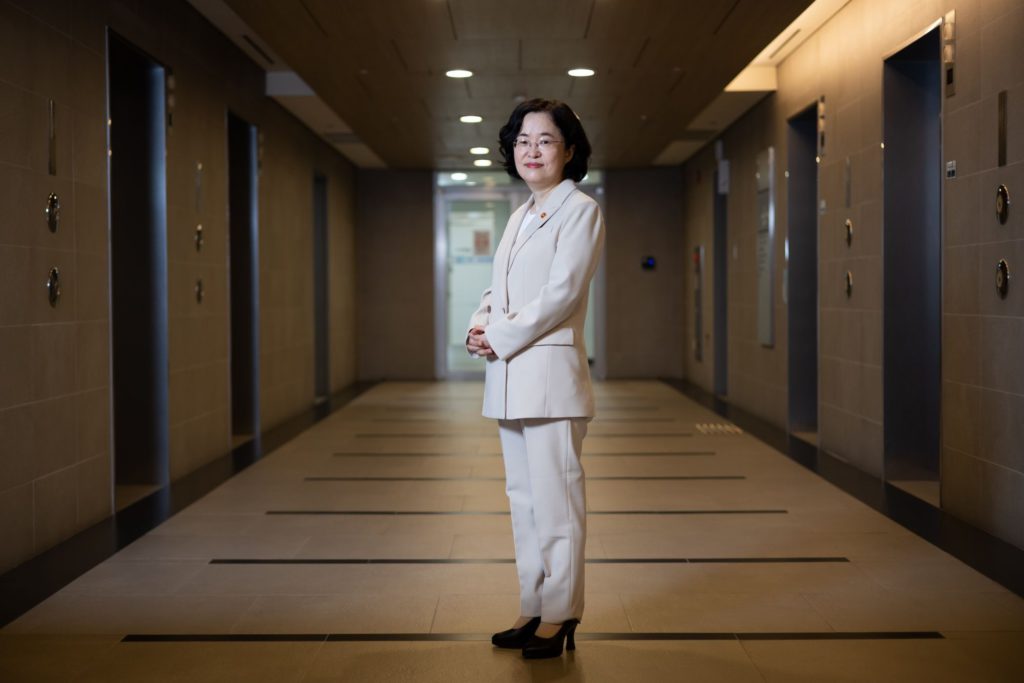(Bloomberg) — South Korea’s powerful antitrust regulator sought to defuse fears of a sweeping tech crackdown as it takes steps to rein in the influence of its fastest-growing online platforms.
Regulators will impose only the minimum necessary regulations and intervene solely where it is imperative to do so, Joh Sung-wook, chairperson of the Korea Fair Trade Commission, told Bloomberg Television in Seoul. The agency’s priority is to prevent companies with dominant market power from abusing it and hurting competition, she added.
Internet titans Naver Corp. and Kakao Corp. shed more than $10 billion of market value in a single day last month, as worries of a Chinese-style crackdown on their lucrative operations grow ahead of presidential elections next year. One lawmaker dubbed Kakao “a symbol of greed,” echoing growing public sentiment that internet giants are widening the country’s socioeconomic divide by encroaching into areas traditionally the domain of small businesses, such as food delivery and taxis.
Korea wants “a true, fair, transparent trade system and ecosystem where big companies and new entrants can grow and innovate together,” Joh said. That will ultimately benefit consumers and the industry as a whole, including big players like Kakao. “Trust us. We are here to help you.”
Read more: Big Tech Replaces Chaebol as Enemy No. 1 Before South Korea Vote
Internet firms boomed during the pandemic, but their growth also made them the prime target of government scrutiny and criticism. The fear is that regulators in Seoul are taking a page from Beijing, which has launched a campaign to tighten oversight of data, online commerce and even after-school tutoring — to devastating effect. Kakao’s founder briefly became the country’s wealthiest person just as his company and its industry took over as a more pressing regulatory concern than the family-run conglomerates that traditionally produce Korea’s billionaires and monopolies.
The country’s stepped-up enforcement has already led to delays in the initial public offerings of Krafton Inc. and Kakao Pay, after regulators questioned their valuations. Financial overseers have imposed new restrictions on fintech platform operators, who now must have a formal registration before selling investment comparison services. Dominant e-tailer Coupang Inc. was fined 3.3 billion won ($2.8 million) by Joh’s agency in August over allegations of unfair trading practices. In response to the heightening scrutiny, Kakao announced it’ll exit some businesses such as hairdressing reservations and salad deliveries.
Read more: Internet Giants Take Fire in Korean Echo of China Crackdown
Korea has shown itself willing to take on the biggest companies, passing a law in September that mandated mobile duopoly Apple Inc. and Alphabet Inc.’s Google must open their mobile app stores to allow alternative payment methods. But Joh said her agency would step in only to curb market abuses, which have been on the rise.
“As platform companies grow big, some of them become gatekeeping monopolies and exploit that power, exerting a dual position as a judge and a player in the market,” she said. “Individual merchants cannot survive without online platforms. The balance of power has broken.”
Joh took up her current post in September 2019 and declared her goal was to establish a “digital fair economy.” She set up an expert task force two months later to monitor the development of information and communications technology in the country.
The ICT monitoring team’s remit covers everything from app markets and digital advertising to automobile software platforms, semiconductors and intellectual property. Any future antitrust pain points that emerge can be added to the list, she said.
Under her leadership, the commission has taken a series of major decisions to curb abuses of power. Delivery Hero SE was ordered to sell its local unit before it could complete its acquisition of rival Woowa Brothers Corp. Apple was pushed to undertake voluntary corrective measures after a probe prompted by complaints from wireless carriers and consumers. And most recently, Google was hit with a $177 million fine for hobbling the development of rivals to its Android operating system.
Read more: South Korea Fines Google for Abusing Smartphone Dominance
The antitrust watchdog is investigating additional cases related to alleged anti-competitive practices by Google in its handling of payments and digital ads. A probe related to allegations the U.S. tech giant hampered developers from releasing applications on other app stores has been completed and the deliberation process is about to commence, Joh said.
“We are currently looking into multiple global and local cases of big online platforms,” she said. “We don’t discriminate between domestic or foreign firms. We have fair standards for all who run a business in Korea.”
The commission is also looking into allegations that Kakao’s de-facto holding company K Cube Holdings — effectively structured as founder Brian Kim’s family office — violated regulations that forbid financial investment holding firms from exercising voting rights in non-financial affiliates. Joh declined to elaborate on the investigation, which centers on Kim’s failure to disclose its corporate structure.
Testifying before lawmakers Tuesday as part of annual parliamentary hearings on pressing national issues, Kim apologized for spurring controversy and disrupting small businesses.
“I feel a greater responsibility to decide between what the company should do and not to do,” Kim said during the hearing. “We will undertake a reorganization and focus more on the global market and technology innovation.”
The Korean antitrust watchdog is pushing for legislative change as existing laws are failing to protect consumers and merchants on online platforms, Joh said. It wants to see a digital platforms fairness act as well as an amendment to the country’s e-commerce law that would expand the scope of platform-owner liability for consumer harm.
“Those laws would mean that we don’t have to actively intervene, so the impact on the industry will be minimal,” said Joh. Asked when new laws could be passed, she answered: “The sooner, the better.”
(Updates with Brian Kim’s comments during a hearing in 15th paragraph)
More stories like this are available on bloomberg.com
©2021 Bloomberg L.P.











